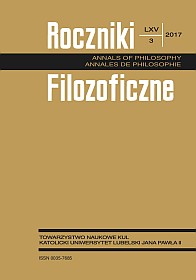Theism and Hard Incompatibilism
Abstract
The aim of the article is to present and to compare the view on human freedom called hard incompatibilism with the contemporary Christian doctrine on human free will. Hard incompatibilism claims that human free will understood both in a libertarian and compatibilist way does not exist. One stresses in the paper that there is a similarity between hard incompatibilism and Christian wisdom rooted in the Bible and this similarity consists in the fact that humans are deeply dependent in their existence on external conditions. Hard incompatiblism identifies that conditions simply as the external or physical world and Christian wisdom points to God as an ontological and axiological foundation of human being and prospects. However, one argues in the paper that the doctrine of human freedom and responsibility for sin and moral evil is a crucial part of the Christian theology and philosophy. Thus, the Christian doctrine is incoherent with hard incompatibilism. There is a proposal, put forth in the last part of the article, how one can reconcile metaphysical indeterminism—which is coherent with hard incompatibilism—with the libertarian doctrine on the human free will, which is coherent with the Christian view on the nature of human freedom.
References
Fischer, John, Robert Kane, Derk Pereboom, Manuel Vargas, red. 2007. Four views on free will. Oxford: Blackwell Publishing.
Hasker, William. 1989. God, Time, and Knowledge. Ithaca and London: Cornell University Press.
Hasker, William. 2011. „Divine Knowledge and Human Freedom”. W: Robert Kane, red. The Oxford Handbook of Free Will, 39–54. Oxford: Oxford University Press.
Hick, John. 1977. Evil and the God of Love. New York: Harper Collins Publishers.
Highfield, Ron. 1995. „The freedom to say ‘No’? Karl Rahner’s doctrine of sin”. Theological Studies 56:485–503.
Highfield, Ron. 2011. „Response to William Lane Craig”. W: Stanley N. Gundry i Dennis W. Jowers, red. Four Views on Divine Providence, 114–122. Michigan: Zondervan.
Hubaczek, Krzysztof. 2010. Bóg a zło. Problematyka teodycealna w filozofii analitycznej. Wrocław: Fundacja na Recz Nauki Polskiej.
Kane, Robert. 2007. „Libertarianism”. W: John Fischer, Robert Kane, Derk Pereboom i Manuel Vargas, red. Four views on free will, 5–43. Oxford: Blackwell Publishing.
Kotarbiński, Tadeusz. 1962. Przykład indywidualny kształtowania postawy wolnomyślicielskiej. Warszawa: Książka i Wiedza.
Łukasiewicz, Dariusz. 2014. Opatrzność Boża, wolność, przypadek. Studium z analitycznej filozofii religii. Kraków: Wydawnictwo Fundacja Dominikańskie Studium Filozofii i Teologii/ Wydawnictwo Polskiej Prowincji Dominikanów „W drodze”/Kolegium Filozoficzno-Teologiczne Polskiej Prowincji Dominikanów.
Roth, K. John. 1981. „A Theodicy of Protest”. W: Stephen T. Davis, red. Encountering Evil: Live Options in Theodicy, 7–22. Atlanta: John Knox Press.
Rowe, William. 1990. „The Problem of Evil and some Varieties of Atheism”. W: Marilyn McCord Adams i Robert Merrihew Adams. The Problem of Evil, 126–137. Oxford: Oxford University Press.
Pereboom, Derk. 2007. „Hard Incompatibilism”. W: John Fischer, Robert Kane, Derk Pereboom i Manuel Vargas, red. Four views on free will, 85–125. Oxford: Blackwell Publishing.
Plantinga, Alvin. 1995. Bóg wolność i zło. Tłum. K. Gurba. Kraków: Wydawnictwo Znak.
Smilansky, Saul. 2000. Free will and illusion. Oxford: Oxford University Press.
Stump, Eleonore. 2003. Aquinas. New York: Routledge.
Swinburne, Richard. 1995. Spójność teizmu. Tłum. Tadeusz Szubka. Kraków: Wydawnictwo Znak.
Copyright (c) 2017 Roczniki Filozoficzne

This work is licensed under a Creative Commons Attribution-NonCommercial-NoDerivatives 4.0 International License.





